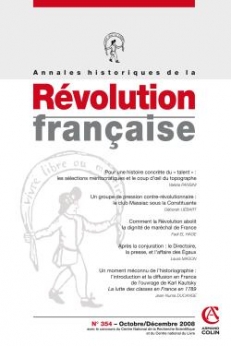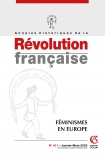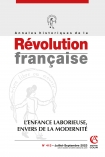
Annales historiques de la Révolution française n° 354 (4/2008)
Numéro épuisé
Recevez les numéros de l'année en cours et accédez à l'intégralité des articles en ligne.
De 1789 à 1791, les populations intéressées dans l’aventure coloniale s’unissent officiellement en société afin de défendre leurs intérêts tant sur le sol métropolitain que dans les Caraïbes. Un important réseau, constitué de négociants et de colons, se développe. Leur rhétorique basée sur un argumentaire économique clairement identifiable joue un rôle important dans l’acceptation du club par les constituants. Durant deux ans cette coalition, soutenue par Barnave et Maury, et dénoncée par Robespierre, lutta afin d’obtenir des constituants, en septembre 1791, l’exclusion de Saint-Domingue du cadre universaliste s’élaborant en métropole.
From 1789 to 1791, many persons interested in the colonial adventure officially united in a club to defend their interests as much within Metropolitan France as in the Caribbean. An important network comprised of merchants and colonists soon developed. Their rhetoric rested on a clearly identifi able economic argument, and played a significant role in the acceptance of the club by the Constituent Assembly. For two years, this coalition supported by Barnave and Maury, and denounced by Robespierre, labored to obtain from the constituents in September 1791 the exclusion of Santo Domingo from universalist framework being conceived in metropolitan France.

